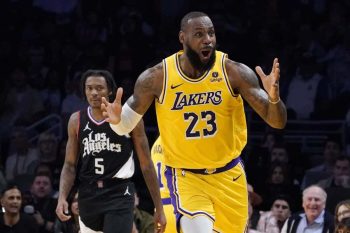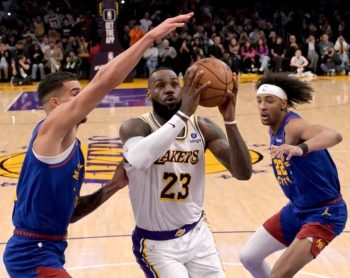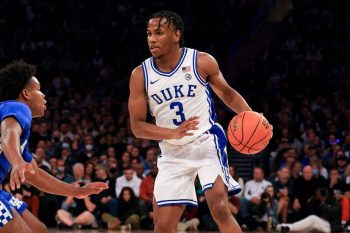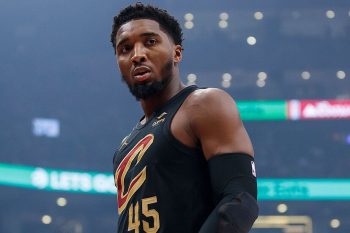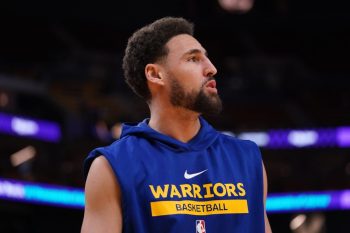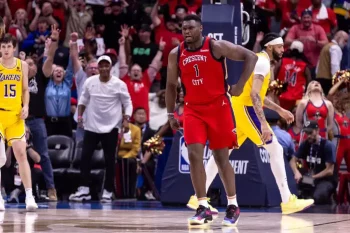NBA
NBA AM: DeAndre Jordan Called His Own Shot

No Foul, But A Lot Of Harm: Yesterday, after making a verbal commitment to the Dallas Mavericks some five days earlier, L.A. Clippers big man DeAndre Jordan made an abrupt left-turn and agreed to re-sign with the Clippers and execute his new four-year, $88 million contract just after midnight.
In what couldn’t have been scripted better by a Hollywood studio, Jordan is reported to have had second thoughts about his agreement with Dallas and expressed that to his former teammates with the Clippers. In turn those players urged team president Doc Rivers to get involved and a huge party of Clippers players and executives traveled to Houston for a final push at Jordan. That push was enough to sway him back to the Clippers.
What followed was comical, with Clipper players tweeting pictures of chairs in front of doors as the narrative on social media was the Clippers players were not leaving Jordan’s house until he signed and would not allow Jordan to speak with anyone from the Mavericks, who had also flown to Houston to try and salvage the deal.
While all of this is strange, none of it was against the rules.
The NBA for some time has allowed free agent players to begin working out contract terms on new deals in the down period called the July Moratorium. By rule, teams and players are not allowed to finalize anything, and are only allowed to discuss contract terms and in no way is either side permitted to create a binding agreement until after the moratorium is lifted.
That has not stopped players from publicly committing to new franchises and teams from agreeing on what a final contract would look like, all of which is commonly called a verbal commitment and for 98 percent of the deals that ultimately get done, these “verbals” are honored and usually get done.
The moratorium serves couple of purposes – the biggest is logistical in nature. The NBA has to finalize all of the accounting for the previous season, which ends with the NBA Finals. Those figures are audited by the Players’ Association, and if anyone has ever dealt with a corporate-style audit between two distrusting parties, that takes time.
During this time, teams are permitted to talk with would-be free agents and this is the crux of the Jordan issue.
As part of a compromise, the window for conversation was introduced that every team a chance to get in front of players they may want to attempt to sign and for players to meet with enough to teams to ensure they got the best deal possible.
In the previous structure, where talks began when deals could be signed, a number of teams felt left out of the process as there was a mad-dash to claim cap money and a large number of tampering and improper deal allegations were made as teams tried to jump start the process. Especially teams that needed to get more than one major free agent deal done.
For the most part, the current system has worked and worked well. Players have honored their verbalized commitments and teams in turn have honored their commits too. However, that has not always been the case. Over the last decade or so, there have been a small handful of deals that got agreed to verbally only to change before the contract was physically signed. There have also been a number of contract offers that were agreed to only to be rescinded later, usually due to injury concerns.
Which brings us back to Jordan. While changing course and re-signing with the Clippers seems a little unethical given the verbalized commitment, Jordan did not break any NBA rules. The Clippers did not violate any rules either. This was simply an unfortunate by-product of there being a nine-day window between a verbal agreement and contract execution, and the Mavericks unfortunately got hosed in the process.
Some have suggested that this issue illustrates a need for a change in the process. The counter to that argument is that more than 60 players made some type of verbal agreement and all but one seems poised to sign where they said they would.
So does the entire system need to be revamped because one guy had a change of heart this year, or that the system has allowed a small handful of these kinds of things in the last 15 years?
Some have suggested that a “letter of intent” type system could solve this, but again, the purposes of the moratorium is to give everyone involved time to talk while the accounting is being done. If the “letter of intent” is somehow binding, then why not do the contract? That then ends the goal of getting the accounting done and finalized and giving teams a chance to meet with everyone they want to meet with.
There is little doubt the Mavericks got hosed in this deal, but the system did not hose them. It was Jordan who did that. Changing the system does not change the root of the problem and that is that Jordan deep down did not want to be a Maverick and that is somehow being glossed over.
Isn’t getting hosed now a little better than inking a huge contract to a guy that clearly did not want to be there?
There was no foul in this action. You can say it was unethical or bad form to go back on your word, but the windows are in place to allow for this kind of thing to occur and most of it is done to ensure good deals that are constructed under good terms where everyone has time to make the right choices.
Jordan made a choice. That in turn created a circus, but it was his choice and he is allowed to make that choice by the rules that everyone else is playing by.
Those rules could be changed to close this loophole, but given how many times this has been an issue, it’s hard to say this is a “problem” needing a solution. This comes down to a guy changing his mind and during the moratorium, this is allowed.
Jamal Crawford Joins The Podcast: In case you missed it, Clippers guard Jamal Crawford stopped by to co-host the Basketball Insiders podcast with Alex Kennedy. With so much drama playing out around the Clippers, Crawford offered his views on what was going to happen with DeAndre Jordan and how all of this played out over the last week. Give it a listen:
Business Is Good: The NBA released the final details of the 2015-2016 NBA Salary cap last night.
The initial projections for the new cap year were always hovering around a $67.1 million number; however after the final audit, the 2015-2016 salary cap came in at $70 million for the cap and $84.740 million as the new luxury tax line.
That represented an 11 percent bump in the cap and a 10 percent bump in the luxury tax.
That also all but assures, that barring a meltdown financially, that the 2016 cap next season could cross the $90 million mark.
A few other notable elements of the cap are that the non-taxpayer mid-level exception (MLE) for this season is set at $5.464 million, the taxpayer mid-level (MMLE) is set at $3.376 million and the mid-level for a team with room under the Salary Cap (Room) is set at $2.814 million.
The minimum salary required by NBA teams is now set at $63 million, teams must meet that figure before the end of the season.
Two teams from last season did not meet the NBA minimum, those included Denver ($773K) and Orlando ($1.9M). Both teams will disperse the balance to their roster players from last season sometime in August, based on a plan agreed to by the NBPA, in essence giving those players an unexpected bonus.
More Twitter: Make sure you are following all of our guys on Twitter to ensure you are getting the very latest from our team: @stevekylerNBA, @AlexKennedyNBA, @LangGreene, @EricPincus, @joelbrigham, @SusanBible @TommyBeer, @JabariDavisNBA , @MokeHamilton , @JCameratoNBA, @iamdpick, @jblancartenba and @CodyTaylorNBA .
